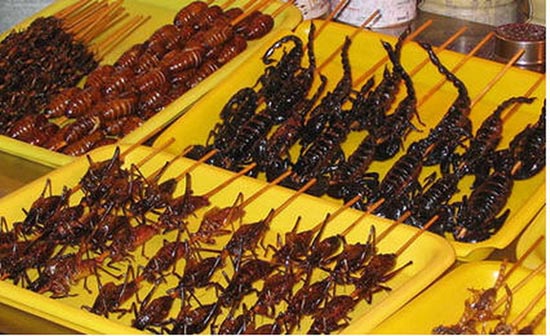Eating insects - a new solution to
In the next few decades, people will have to change their eating habits and shift from eating meat to eating insects to protect the environment. It is possible that many people will consider this a funny joke, but that is the conclusion of a research just published by Dutch scientists.
 Dishes from insects
Dishes from insects
According to scientists, in the near future, pests may replace meat in supermarkets. It is true that chicken, beef and pork are rich in proteinine, but they are also a source of a lot of methane, a greenhouse effect, even more polluted than CO2.
By the time the phenomenon of warming the atmosphere threatens the Earth, environmentalists are worried about the increasing consumption of meat. Pests also contain a lot of proteine, but have the advantage of being low in fat , which emits very little CO2, the price is much cheaper than meat. Eating insects, insects also has the advantage of not being afraid of mad cow disease, blue ear pig, bird flu or trematode etc .
Moreover, with 10 kg of plants, we only produce 1 kg of meat, while the same amount can produce 6 to 8 kg of insects. Obviously, the productivity of pests is much higher than that of pigs, cows and chickens.
Scientists believe that, in order to ensure the necessary protein content, both protect the environment and avoid disease, people are prepared to enjoy dishes such as " grasshopper rolls" or "pupae soaked in sweet and fried deep-fried flour " . Scientists also predict that in the future, many insects will be ground into flour, so that they can be processed into more familiar dishes such as bread, so those who are afraid of insects can also eat.
Scientists conclude, no matter what, humans will have to eat less meat or find an alternative protein source , according to the forecast of the United Nations Food and Agriculture Organization (FAO) , by 2050, the population The world will increase to 9 billion people. By then, the area of existing agricultural land would not be able to provide enough meat for everyone.
- Insect-eating insects like to eat
- Eating insects is better for the environment than vegetarian eating dairy products
- Eating crickets and insects is very good for the intestinal tract
- Eating insects help the human brain evolve?
- Eating insects to protect the environment
- Earth warms, insects eat more plants
- Set of brilliant photos showing off
- Stink bugs feed themselves to survive
- Why are insect dishes delicious but dangerous?
- Food sources from insects
- Assassin insects in nature
- What will happen if insects disappear from Earth?
 Is the magnetic North Pole shift dangerous to humanity?
Is the magnetic North Pole shift dangerous to humanity? Washington legalizes the recycling of human bodies into fertilizer
Washington legalizes the recycling of human bodies into fertilizer Lightning stone - the mysterious guest
Lightning stone - the mysterious guest Stunned by the mysterious sunset, strange appearance
Stunned by the mysterious sunset, strange appearance